Rida Akzar, a PhD student at GFAR was awarded a scholarship to attend the 2018 annual Crawford Fund Conference. The theme for this year’s conference was ‘Reshaping Agriculture for Better Nutrition – The Agriculture, Food, Nutrition, Health Nexus’. Rida was one of the 44 young scholars chosen from across Australia after a competitive selection process to attend the conference. The conference was held in The Parliament House in Canberra from 13th to 15th August 2018. In this blog, Rida reflects back on his experience of attending the conference and the scholar program.
Reflections on the Conference
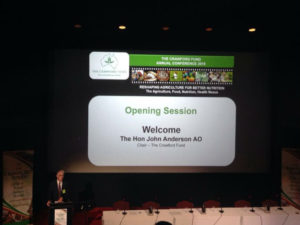
Conference opening by The Hon John Anderson AO (Chair of The Crawford Fund)
This year the conference revolved around the important issue of nutrition. A recent report by Food and Agriculture Organisation (FAO) in 2017 reported number of chronically undernourished people has increased by almost 5%, from 777 million in 2015 to 815 million in 2017, which means around 11.7% of the world population are still undernourished. The conference was opened by The Hon John Anderson AO, Chair of The Crawford Fund, where he highlighted that the nutrition issue occurs not only in developing countries but also in developed countries through the prevalence of malnutrition and obesity.
The first keynote session was on the overview of the global challenges we face in order to feed the growing world population with healthy food while ensuring our agricultural systems remain sustainable. Dr.Alessandro Demaio of EAT Forum highlighted in his presentation that the production of red meat is currently 468% more than the global demand, on the other hand there is less production of fruits (-44%), vegetables (-11%), milk (-49%) and nuts and seeds (-68%). This shows that our food system is unbalanced. The second session was on the challenges and the impact of poor nutrition, delivered by Dr. Jessica Fanzo of UN FAO. In her talk, she emphasised that malnutrition burden has multiple consequences, including impact on health (over and undernutrition) such as mental health issues, disability issues and low quality of life, along with social impact through reduction by 22-45% of lifetime earnings; and economic impacts which put burden on the economy.
This was followed by Prof. Andrew Campbell of Australian Centre for International Agricultural Research (ACIAR) on how agriculture can respond to nutrition challenges. He pointed out that a collaborative effort is needed amongst stakeholders in the food chain in order to tackle the nutrition challenge. This session included several case study presentations that described how the Agri-food sector has potential to feed people with nutritious food. The fourth session focused on lessons learnt from international projects that aim to address nutritional challenges in developing countries. These included examples of behavioural change of growers in Papua New Guinea to improve nutrition (Tania Paul of Charles Darwin University & Philmah Seta Waken of National Agricultural Research Institute (NARI); nutrition sensitive agriculture program in Timor Leste (Annie Major of Adam Smith International); role of aquaculture in Bangladesh (Dr.Jessica Boggard of CSIRO & Dr Shamia Chowdhury of World Fish); and the potential of iron bio fortified cereals to alleviate hunger in Africa (A/Prof. Alex Johnson, University of Melbourne).
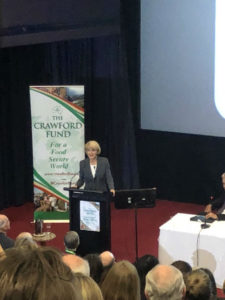
Hon Juile Bishop MP delivering the ministerial address
The ministerial address was presented by the then Minster of Foreign Affairs, Hon Julie Bishop MP. In her speech, she highlighted the contribution of Australia through it’s research expertise in the international agriculture development efforts in developing countries. One of the examples of impact of research for development work was the Agora Food Studio in Timor Leste that promotes local food diversity and culture, supported by the DFAT Innovation Exchange. Additionally, she also proudly mentioned that every $1 AUD spent on international aid, it returns $7 AUD through income from export.
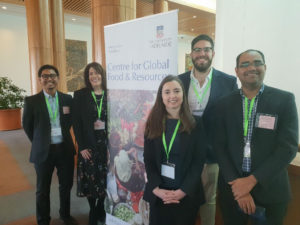
From left to right: Rida, Prof. Wendy Umberger, Prof. Sarah Wheeler, Jack Hetherington, and Rohan Yargop
Key takeaway messages from the conference:
- A key component for achieving sustainable development goals is a food system that not only produces enough food but also food that is nutritious and environmentally sustainable.
- Importance of region specific, local food systems is central to providing better nutrition to people; therefore, it is essential to focus research activities on promotion of staple foods.
- From the presented case studies, it can be learnt that community engagement is important in international agricultural development to fully understand the problems and find solutions for the community. This approach is important in all the stages of research and development so that it benefits the community.
- Lastly, the role of interdisciplinary collaboration was highly emphasised in the conference. Collaboration in research and development activities across the spectrum of available expertise is needed to respond to the challenge of feeding nutritious food to the world population. This issue should be looked holistically along the food chain.
Reflections on the Scholar Program
The Crawford Fund Scholar Program consisted several talks that featured speakers who have experience in international agricultural development and networking activities. This scholar program is organised by The Crawford Fund and RAID (Researchers in Agriculture for International Development). The scholar program is a unique capacity-building and networking platform for young researchers and professionals in the research for development space. The scholars are paired with mentors who are experienced researchers. It is a good opportunity for the scholars to develop their networking skills through this program.
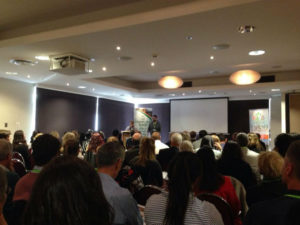
Cathy Reade (Director of Outreach of Crawford Fund) and Jack Hetherington (President of RAID) welcome the Crawford Fund scholars
The mentoring program gives an opportunity for scholars to directly learn from their mentors about research, career development and other technical skills. Rida was paired with Dr Hassan Warriach who is a Postdoctoral Fellow from University of Melbourne. He has extensive experience on the development of dairy sector in Pakistan through ACIAR funded projects. Interacting with Dr.Hassan gave Rida useful insights on dairy in Pakistan and development work undertaken. This will help him use some of the skills and resources in his PhD on the IndoDairy Project.
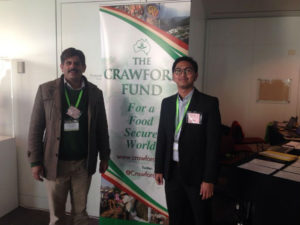
Rida with his Mentor: Dr Hassan Warriach
Rida summed up two takeaway messages from this scholar program:
- Networking, networking, networking. From most of the speakers’ experience, their international career exposure stemmed from their networks, coupled with good communication and collaborative skills. Networking skills can be improved by attending conferences, workshops and being part of platforms like RAID.
- Having a mentor is recommended. A mentor is a person who has experience in their field. The mentor can guide their mentee based on their experience in the field and help to expand mentee’s networks. More importantly, a mentor-mentee relationship should evolve overtime.
Special thanks to AARES SA Branch who supported the scholarship for Rida to attend the 2018 Crawford Fund Conference and Scholars Program.
The conference program and speakers’ presentations can be downloaded here
This blog post was prepared by Rida Akzar

